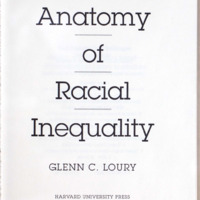-
Title
-
The anatomy of racial inequality
-
Description
-
An account of how racial classifications are created and perpetuated and how they resonate through the social, psychological, spiritual and economic life of this nation.--cover.
-
Identifier
-
995383
-
674006259
-
Creator
-
Loury, Glenn C
-
Source
-
Brian Lamb Booknotes Collection
-
Gift of Brian Lamb, 2011.
-
Catalog record
-
Language
-
eng
-
Date
-
2002
-
Program air date: August 4, 2002
-
Publisher
-
Harvard University Press
-
George Mason University. Libraries. Special Collections & Archives
-
Text
-
Transcription of Annotations
Notes from front endpapers: "Is the race problem special to United States? - Racial stereotyping vs. racial stigma. - Quest for social justice entails a commitment to affirmative action, p. 167. - We need [a] vision of race egalitarianism, p. 169. - What is liberal political theory? - Racial solidarity among blacks - a good idea. - BET - million man march. - How much racial inequality is there in America today? What about other countries? - Jails: 1.2 million of 2 million. - You become less intelligent as you get older. - Slavery: dishonor, p. 69. - Racial profiling; racial markers. - Feedback loops explain what you mean, p. 28. - Book dedicated to Thomas C. Schelling. - Institute on Race and Social Division at B.U. - Major conclusion, p. 168. - Racial preferences for education - why not for basketball? What about white C students like me? - What is race? (p. 20) - What do you think about Cornel West and Harvard and Princeton? - Adopting Asian babies over Black. - Racial stigma - bandannas and stocking caps. - The NFL ban, p. 210. - Capital punishment." -- Back endpapers contain a brief summary of the author's career; other notes refer to an assault charge and cocaine possession, his becoming a born-again Christian, the severing of ties with Orlando Patterson and Clarence Thomas, and Prop[osition] 209 which eliminates race preference. -- Annotations by Brian Lamb in the margins and underlining of pertinent phrases throughout the book. - Example: p.168: "The unfair treatment of persons based on race in formal economic transactions is no longer the most significant barrier to the full participation of blacks in American life. More important is the fact that too many African Americans cannot gain access to anything approaching equal terms to social resources that are essential for human flourishing, but that are made available to individuals primarily through informal, culturally mediated, race-influenced social intercourse."
-
Subject
-
"African Americans--Social conditions--1975-"
-
"African Americans--Economic conditions."
-
"African Americans--Civil rights."
-
"Race discrimination--United States."
-
"Race discrimination--Political aspects--United States."
-
Relation
-
Original Booknotes interview
-
Rights
-
This work may be protected by copyright laws and is provided for educational and research purposes only. Any infringing use may be subject to disciplinary action and/or civil or criminal liability as provided by law. If you believe that you are the rights-holder and object to Mason’s use of this image, please contact speccoll@gmu.edu.
 995383.pdf
995383.pdf